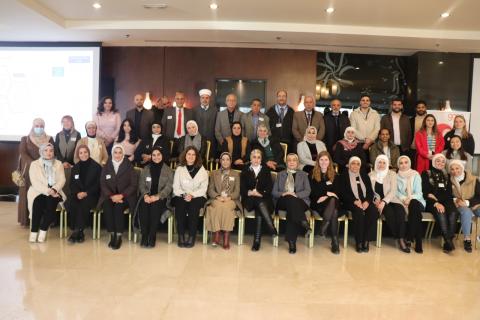

In an extensive meeting held on Monday with the participation of a large number of representatives of concerned national governmental bodies, non-governmental and international organizations, United Nations agencies, civil society and academics, the Gender and Adolescence: Global Evidence (GAGE) programme, in cooperation with the Higher Population Council and ShareNet Jordan, launched two policy papers on adolescent sexual and reproductive health. The first paper focused on “Addressing the culture of silence in order to improve the Sexual & Reproductive Health of adolescent girls and boys in Jordan,” while the second paper addressed “Sexual and Reproductive Health information and services: opportunities and challenges for the health of disadvantaged youth in Jordan.”
The two papers aimed to contribute to providing scientific evidence to policy and programming actors to support the implementation of programmes than can support all adolescents and youth in Jordan to obtain reliable sexual and reproductive health information and services. They also shed light on the challenges facing adolescents, male and female, in disadvantaged communities in Jordan, and facilitated discussion on how to address the main obstacles for advancing the sexual and reproductive health of adolescents and youth and how policies and programs can respond to these challenges.
The Gender and Adolescence: Global Evidence (GAGE) programme is a multi-stage longitudinal study supported by the Foreign and Commonwealth Office for Development in the United Kingdom. It is implemented with a large and diverse sample of 3,000 adolescents from different groups in the governorates of Amman, Irbid, Jerash, Mafraq, and Zarqa. This sample consists of adolescent girls and boys from remote and less fortunate Jordanian communities, as well as refugee communities. The study focuses on the comprehensive well-being of adolescents, including access to information and services related to sexual and reproductive health.
The study revealed that girls and young women had greater access to information about puberty than boys and young men (93% vs. 72%), primarily because mothers (43%) - but not fathers (9%) - talk to their children about pubertal changes. However, the study also revealed that menstruation affects the daily activities of more than half (56%) of girls and young women. It found that more than half of them felt embarrassed (39%) or afraid (14%) to ask family members to buy menstrual supplies on their behalf. About three-fifths (57%) of adolescent girls reported that their schools had adequate menstrual management facilities; while the rest of the girls indicated that there are very few sanitary facilities and waste disposal bins, the lack of adequate privacy, and the lack of water. Girls with disabilities reported that they were least able to access school facilities (44%), sometimes due to the lack of health facilities equipped for people with special needs and sometimes due to the lack of teaching assistants who could support them.
The study also found out that more than four-fifths (81%) of the adolescent girls who had married as children in the sample had already begun child-bearing, and that motherhood rates among girls married in childhood were higher than their peers married as adults (89%). Attitudes regarding spousal violence among young men in the study were also worrying: three-quarters (75%) of young men agreed that wives owed their husbands complete obedience, and boys and young men were more likely to agree with this view (86%) than girls and young women (66%).
In the opening session of the meeting, Professor Dr Issa Al-Masarweh, Secretary General of the Higher Population Council, reviewed the national efforts made by the Council in cooperation with partners in creating a conducive policy and programme environment to support and strengthen protection elements for adolescents of both sexes, and reduce the dangers to which adolescents and youth are exposed. This requires that comprehensive health education becomes a part of the regular school curriculum, delivered by well-trained and supported teachers, as teachers remain a trusted source of knowledge and skills across all educational systems and are a highly valued component of the Jordanian family and society. Comprehensive health education on reproductive and sexual health issues in adulthood, adolescence and youth can provide young people with scientifically accurate information appropriate to their age group and that is fitting for the Jordanian cultural and religious context. The Secretary-General also stressed the importance of strengthening the role of parents and the family regarding sexual education, by empowering parents with accurate information related to the health of their adolescent children, both male and female, and enhancing dialogue between parents and their children.
On her part, Dr Nicola Jones, Director of GAGE and Principal Research Fellow at ODI, highlighted that there is an urgent need for complementary community life skills programs to focus on gender norms change and meet the needs of adolescents for information on sexual and reproductive health, as well as for parents to strengthen the communication between parents and adolescents on these important life issues, the results of this meeting contributed to highlighting the gaps faced by adolescents, both male and female, in less fortunate communities in Jordan, and facilitating discussion on how to address the main determinants of sexual and reproductive health for adolescents and youth, and served as an important platform to discuss policy and programming responses to these challenges.
The meeting also identified findings and evidence-based priorities for policy makers and programme designers to advance the strengthening of sexual and reproductive health information and services for adolescents and youth, including the most marginalized communities. These issues are critical in advancing evidence-informed progress in regard to Jordan’s commitments towards the international Sustainable Development Goals 2030 as well as the goals of the National Population Strategy 2021 -2030 and the Reproductive and Sexual Health Strategy 2020-2030.







